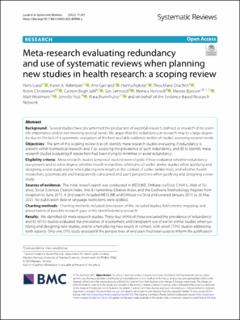| dc.description.abstract | Background Several studies have documented the production of wasteful research, defined as research of no scientific importance and/or not meeting societal needs. We argue that this redundancy in research may to a large degree be due to the lack of a systematic evaluation of the best available evidence and/or of studies assessing societal needs. Objectives The aim of this scoping review is to (A) identify meta-research studies evaluating if redundancy is present within biomedical research, and if so, assessing the prevalence of such redundancy, and (B) to identify meta-research studies evaluating if researchers had been trying to minimise or avoid redundancy. Eligibility criteria Meta-research studies (empirical studies) were eligible if they evaluated whether redundancy was present and to what degree; whether health researchers referred to all earlier similar studies when justifying and designing a new study and/or when placing new results in the context of earlier similar trials; and whether health researchers systematically and transparently considered end users’ perspectives when justifying and designing a new study. Sources of evidence The initial overall search was conducted in MEDLINE, Embase via Ovid, CINAHL, Web of Science, Social Sciences Citation Index, Arts & Humanities Citation Index, and the Cochrane Methodology Register from inception to June 2015. A 2nd search included MEDLINE and Embase via Ovid and covered January 2015 to 26 May 2021. No publication date or language restrictions were applied. Charting methods Charting methods included description of the included studies, bibliometric mapping, and presentation of possible research gaps in the identified meta-research. Results We identified 69 meta-research studies. Thirty-four (49%) of these evaluated the prevalence of redundancy and 42 (61%) studies evaluated the prevalence of a systematic and transparent use of earlier similar studies when justifying and designing new studies, and/or when placing new results in context, with seven (10%) studies addressing both aspects. Only one (1%) study assessed if the perspectives of end users had been used to inform the justification and design of a new study. Among the included meta-research studies evaluating whether redundancy was present, only two of nine health domains (medical areas) and only two of 10 research topics (different methodological types) were represented. Similarly, among the included meta-research studies evaluating whether researchers had been trying to minimise or avoid redundancy, only one of nine health domains and only one of 10 research topics were represented. Conclusions that relate to the review questions and objectives Even with 69 included meta-research studies, there was a lack of information for most health domains and research topics. However, as most included studies were evaluating across different domains, there is a clear indication of a high prevalence of redundancy and a low prevalence of trying to minimise or avoid redundancy. In addition, only one meta-research study evaluated whether the perspectives of end users were used to inform the justification and design of a new study. | en_US |

